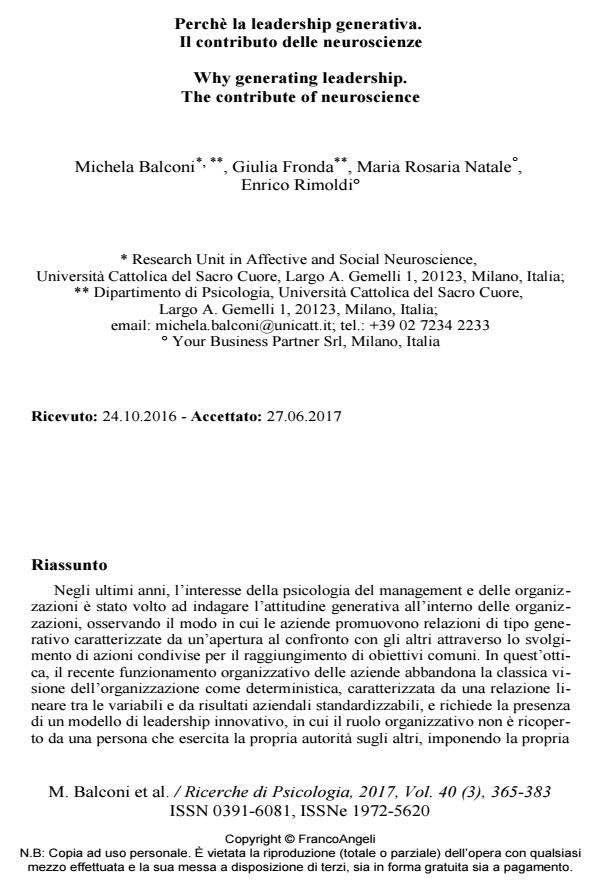Perchè la leadership generativa. Il contributo delle neuroscienze
Titolo Rivista RICERCHE DI PSICOLOGIA
Autori/Curatori Michela Balconi, Giulia Fronda, Maria Rosaria Natale, Enrico Rimoldi
Anno di pubblicazione 2017 Fascicolo 2017/3
Lingua Italiano Numero pagine 19 P. 365-383 Dimensione file 220 KB
DOI 10.3280/RIP2017-003007
Il DOI è il codice a barre della proprietà intellettuale: per saperne di più
clicca qui
Qui sotto puoi vedere in anteprima la prima pagina di questo articolo.
Se questo articolo ti interessa, lo puoi acquistare (e scaricare in formato pdf) seguendo le facili indicazioni per acquistare il download credit. Acquista Download Credits per scaricare questo Articolo in formato PDF

FrancoAngeli è membro della Publishers International Linking Association, Inc (PILA), associazione indipendente e non profit per facilitare (attraverso i servizi tecnologici implementati da CrossRef.org) l’accesso degli studiosi ai contenuti digitali nelle pubblicazioni professionali e scientifiche.
Negli ultimi anni, l’interesse della psicologia del management e delle organizzazioni è stato volto ad indagare l’attitudine generativa all’interno delle organizzazioni, osservando il modo in cui le aziende promuovono relazioni di tipo generativo caratterizzate da un’apertura al confronto con gli altri attraverso lo svolgimento di azioni condivise per il raggiungimento di obiettivi comuni. In quest’ottica, il recente funzionamento organizzativo delle aziende abbandona la classica visione dell’organizzazione come deterministica, caratterizzata da una relazione lineare tra le variabili e da risultati aziendali standardizzabili, e richiede la presenza di un modello di leadership innovativo, in cui il ruolo organizzativo non è ricoperto da una persona che esercita la propria autorità sugli altri, imponendo la propria visione individuale. Il nuovo modello di leadership, infatti, a differenza delle teorie classiche sulla figura del leader, promuove e facilita l’evoluzione di comportamenti d’interazione attraverso la creazione di condizioni per l’autorganizzazione degli individui e la generazione di contesti che favoriscano interconnessioni e scambi reciproci. La nuova figura del leader "generativo" valorizza ogni componente del proprio team di lavoro attraverso un focus sul "care", migliorando l’efficacia relazionale e promuovendo l’autonomia decisionale dei propri collaboratori. Alla luce di questa nuova prospettiva all’interno dei contesti aziendali, l’interesse delle neuroscienze si è focalizzato sullo studio delle componenti che possono favorire una condizione di benessere all’interno dei contesti aziendali, concentrandosi sulle capacità di leadership e sulle dinamiche relazionali.
Parole chiave:Lleadership generativa, sistemi organizzativi generativi, neuro-scienze sociali, neuroleadership, autonomia decisionale, interdipendenza.
- The Neurological Correlates of Leadership and their Relevance to Education 5.0 Navreet Kaur, in SDMIMD Journal of Management /2025 pp.85
DOI: 10.18311/sdmimd/2025/48906 - Face-to-face vs. remote digital settings in job assessment interviews: A multilevel hyperscanning protocol for the investigation of interpersonal attunement Michela Balconi, Giulia Fronda, Federico Cassioli, Davide Crivelli, Humaira Nisar, in PLOS ONE /2022 pp.e0263668
DOI: 10.1371/journal.pone.0263668 - Drawing the business management perspective of the Disruptive Based on brain coaching skills and design thinking Ehsan chitsaz, marziyeh bakhtiari, in Quarterly Journal of Skill Training /2023 pp.157
DOI: 10.61186/irtvto.11.43.157
Michela Balconi, Giulia Fronda, Maria Rosaria Natale, Enrico Rimoldi, Perchè la leadership generativa. Il contributo delle neuroscienze in "RICERCHE DI PSICOLOGIA " 3/2017, pp 365-383, DOI: 10.3280/RIP2017-003007